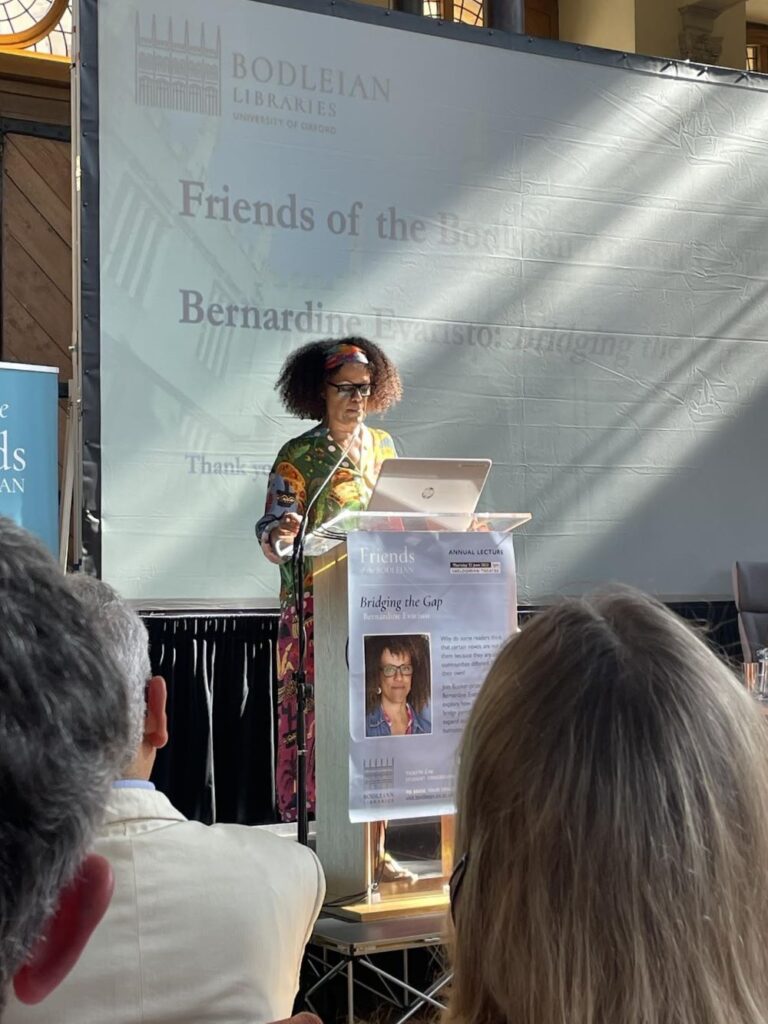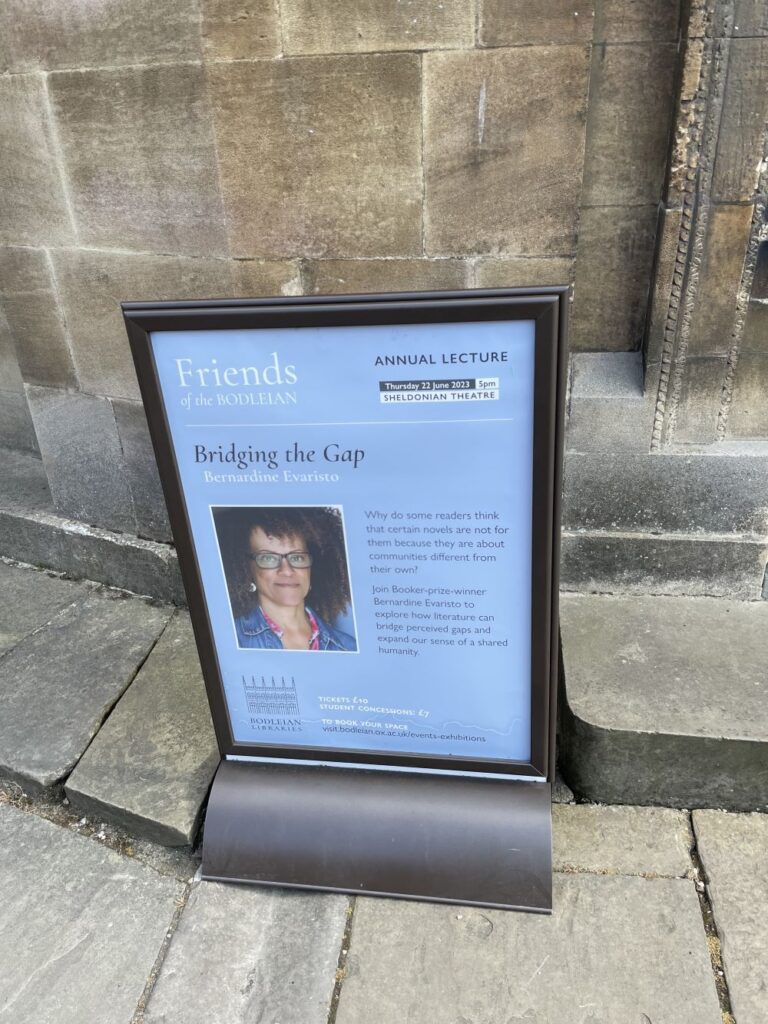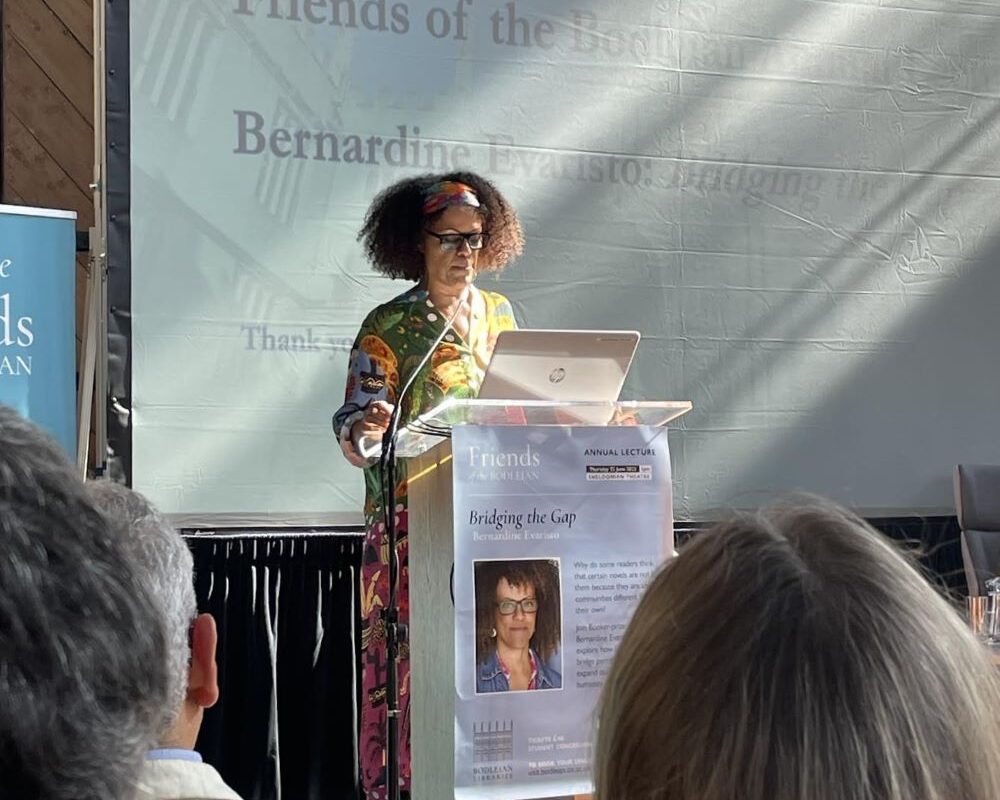Sustaining the Momentum: Bernardine Evaristo speaks at Oxford’s Sheldonian Theatre, 22 June 2023
Ciaran Duncan
In a city not short on spaces that can feel intimidating, the Sheldonian Theatre in Oxford is especially prominent. Here is where Oxford’s students file in for their Graduation ceremonies. Where we talk about cultural gatekeepers, the Sheldonian is an especially well-established one–designed by the architect Christopher Wren to resemble a Roman theatre, with a (rather good) Siegfried Sassoon poem set in and named after it. What a pleasure, then, to see this space filled not by a parade of gowns competing for attention with the imposing baroque painted ceiling, but by the 2019 Booker Prize-winner, and longstanding Writers Make Worlds author, Bernardine Evaristo.

Evaristo is a writer and academic in possession of sharp intellect and passionate clarity of communication and this was in clear evidence in her 22 June Friends of the Bodleian talk, entitled “Bridging the Gap”. In it, she offered a virtuosic tour of postwar Black British literary history before zooming in on the literary landscape of 2023. Her through-line was the contribution of black female authors and their extra struggle to be heard and promoted, something she has directly experienced as well as studied.
Indeed, Evaristo’s talk was studded with personal testimony. She recalled how a top UK agent told her that her novel Mr Loverman (2013) was “too niche” (read: “black and queer”) to find success. This anecdote left me nearly tearing my hair out since that novel means a lot to me for the way it avoids the pattern of many successful queer novels which depict coming-of-age stories heavily focused on trauma and often lacking in any trace of humour. Evaristo is always keen to twist agilely away from stereotyping. For instance, she says she is often told in interviews that her most celebrated book Girl, Woman, Other (2019) is “a novel about race”. Why not consider it a novel “about” relationships or generational divides instead or as well? she asked.

Photograph: Elleke Boehmer
In Evaristo’s account of modern Black British literary history, especial and due prominence was given to Buchi Emecheta, the trailblazing author whose life straddled Nigeria and Britain. Back in the 1970s and 80s, Emecheta’s work afforded Evaristo her introduction to books about black women’s lives. Of particular importance to her were Emecheta’s second novel Second Class Citizen (1974) and, above all, her later work The Joys of Motherhood (1979). That latter novel offers an indelible portrayal of an Igbo woman’s experience of working-class colonial Nigeria. Evaristo makes the case for this as an equally ground-breaking “female counterpart” to Chinua Achebe’s Things Fall Apart (1958), an unforgettable novel, now a classic, and, perhaps more than any other, a staple of postcolonial literature courses and reading lists everywhere. Evaristo drew her audience’s attention to the fact that so often the books taken as representatives of a period or movement are those authored by men. For instance, Sam Selvon’s The Lonely Londoners is often talked about as “the” novel of the Windrush generation (and rather less discussed for its limited portrayal of female characters). Evaristo is not one to let any form of marginalisation go ignored and unexplored.
After discussing the intervening contributions of the likes of Andrea Levy and Judith Bryan, Evaristo homed in on the “lovely flourishing” of books by Black women that has occurred in Britain over the last few years. Here she highlighted in detail four novels published in 2023 that she has enjoyed; Writers Make Worlds author Diana Evans’ fourth novel, A House for Alice, the sequel to her award-winning Ordinary People, and set in the aftermath of the Grenfell tragedy; Jacqueline Crooks’ debut, Fire Rush, which explores the relationships between young black Brits amidst the 1970s dub reggae scene, and has already been shortlisted for the 2023 Women’s Prize for Fiction; The List by Yomi Adegoke, which ambivalently explores the impact of social media allegations in the age of MeToo, and which Evaristo commended for its “entertaining versatility” of voices; and, finally, the founder of the pioneering gal-dem magazine Liv Little’s Rosewater, which for Evaristo marks “a generational first” in its “sexy and bodacious” portrayal of a young queer black woman in London. Noticeably, in the case of The List and Rosewater, she picks out qualities redolent of her own many-voiced mosaic of a novel Girl, Woman, Other. In Evaristo’s own words, GWO’s 2019 Booker Prize win has catapulted her from “Bernardine who?!” to “Bernardine, we’re so honoured to meet you!”. As well as rocket-fuelling her sales, the win gave her the platform that she used so judiciously in her talk to both recognise the women who have come before her, and spotlight her younger contemporaries who are helping to make this such an exciting time to be a reader.
In the post-lecture Q&A especially, Evaristo was sharp-eyed on the institutional underpinnings–the publishing industry, libraries, schools–that heavily influence who is read, studied and canonised. She described London’s Woolwich library as “the making of me” as a child. She referred to the Runnymede Trust’s 2021 report, Lit In Colour, which found that, at that time, fewer than 1% of students at GCSE studied a book by a writer of colour. Essentially, it is still possible to go through the entire UK education system being given only books by white writers. Finally, Evaristo discussed the Black Britain Writing Back series–“a huge passion project of mine”–that she has curated with Penguin and that has reissued landmark works by the likes of Beryl Gilroy and C.L.R. James.
Generous with enthusiasm and intellect, the overriding impression her talk left is one of life lived as a major passion project and a relationship to other people and language that is playful, curious and always open to new possibilities. Whether you look to novels for beauty or learning, community or self-interrogation, listening to Evaristo can only foster a sense of excitement at the further “lovely flourishing” to come if readers and writers manage to sustain the momentum behind Black British women’s writing.
Cite this: Duncan, Ciaran. “Sustaining the Momentum: Bernardine Evaristo speaks at Oxford’s Sheldonian Theatre, 22 June 2023.” Postcolonial Writers Make Worlds, 2023, https://writersmakeworlds.com/essay-evaristo-bridging-the-gap-sheldonian. Accessed 6 September 2023.
